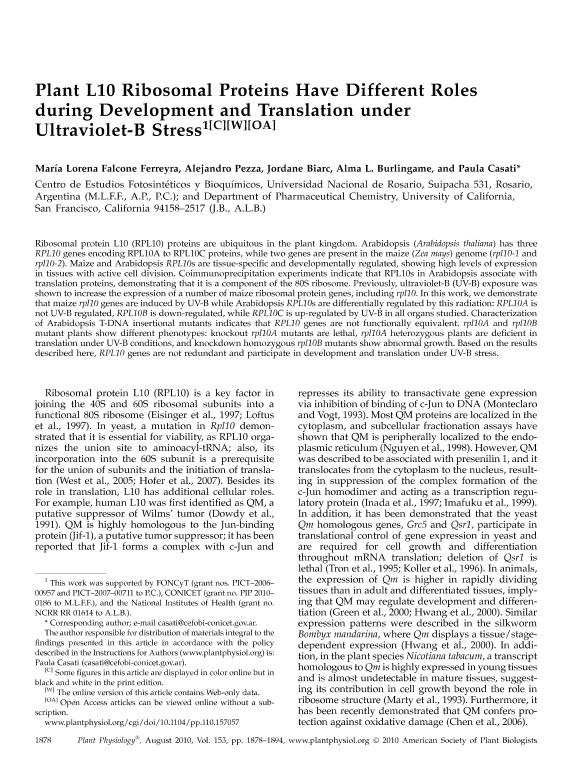Artículo
Plant L10 Ribosomal proteins have different roles during development and translation under ultraviolet-B stress
Falcone Ferreyra, María Lorena ; Pezza, Alejandro
; Pezza, Alejandro ; Biarc, Jordane; Burlingame, Alma L.; Casati, Paula
; Biarc, Jordane; Burlingame, Alma L.; Casati, Paula
 ; Pezza, Alejandro
; Pezza, Alejandro ; Biarc, Jordane; Burlingame, Alma L.; Casati, Paula
; Biarc, Jordane; Burlingame, Alma L.; Casati, Paula
Fecha de publicación:
2010
Editorial:
American Society Of Plant Biologist
Revista:
Plant Physiology
ISSN:
1532-2548
Idioma:
Inglés
Tipo de recurso:
Artículo publicado
Clasificación temática:
Resumen
Ribosomal protein L10 (RPL10) proteins are ubiquitous in the plant kingdom. Arabidopsis (Arabidopsis thaliana) has three RPL10 genes encoding RPL10A to RPL10C proteins, while two genes are present in the maize (Zea mays) genome (rpl10-1 and rpl10-2). Maize and Arabidopsis RPL10s are tissue-specific and developmentally regulated, showing high levels of expression in tissues with active cell division. Coimmunoprecipitation experiments indicate that RPL10s in Arabidopsis associate with translation proteins, demonstrating that it is a component of the 80S ribosome. Previously, ultraviolet-B (UV-B) exposure was shown to increase the expression of a number of maize ribosomal protein genes, including rpl10. In this work, we demonstrate that maize rpl10 genes are induced by UV-B while Arabidopsis RPL10s are differentially regulated by this radiation: RPL10A is not UV-B regulated, RPL10B is down-regulated, while RPL10C is up-regulated by UV-B in all organs studied. Characterization of Arabidopsis T-DNA insertional mutants indicates that RPL10 genes are not functionally equivalent. rpl10A and rpl10B mutant plants show different phenotypes: knockout rpl10A mutants are lethal, rpl10A heterozygous plants are deficient in translation under UV-B conditions, and knockdown homozygous rpl10B mutants show abnormal growth. Based on the results described here, RPL10 genes are not redundant and participate in development and translation under UV-B stress.
Palabras clave:
Uv-B
,
Ribosomal Proteins
,
Arabidopsis Thaliana
,
Translation
Archivos asociados
Licencia
Identificadores
Colecciones
Articulos(CEFOBI)
Articulos de CENTRO DE EST.FOTOSINTETICOS Y BIOQUIMICOS (I)
Articulos de CENTRO DE EST.FOTOSINTETICOS Y BIOQUIMICOS (I)
Articulos(IBR)
Articulos de INST.DE BIOLOGIA MOLECULAR Y CELULAR DE ROSARIO
Articulos de INST.DE BIOLOGIA MOLECULAR Y CELULAR DE ROSARIO
Citación
Falcone Ferreyra, María Lorena; Pezza, Alejandro; Biarc, Jordane; Burlingame, Alma L.; Casati, Paula; Plant L10 Ribosomal proteins have different roles during development and translation under ultraviolet-B stress; American Society Of Plant Biologist; Plant Physiology; 153; 4; 2010; 1878-1894
Compartir
Altmétricas



